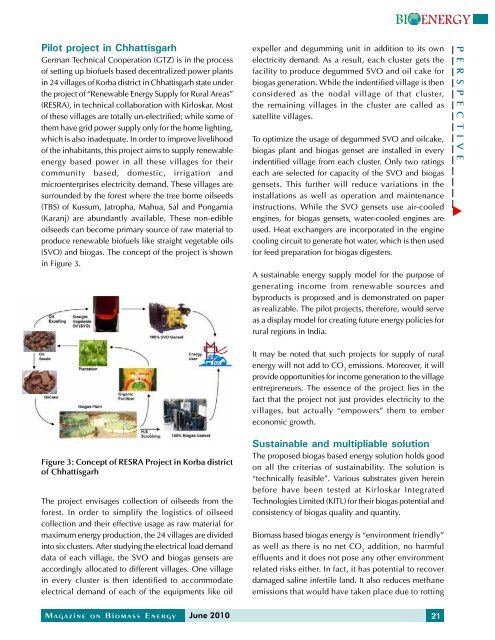issue 4 - United Nations Development Programme
issue 4 - United Nations Development Programme
issue 4 - United Nations Development Programme
Create successful ePaper yourself
Turn your PDF publications into a flip-book with our unique Google optimized e-Paper software.
Pilot project in Chhattisgarh<br />
German Technical Cooperation (GTZ) is in the process<br />
of setting up biofuels based decentralized power plants<br />
in 24 villages of Korba district in Chhattisgarh state under<br />
the project of “Renewable Energy Supply for Rural Areas”<br />
(RESRA), in technical collaboration with Kirloskar. Most<br />
of these villages are totally un-electrified; while some of<br />
them have grid power supply only for the home lighting,<br />
which is also inadequate. In order to improve livelihood<br />
of the inhabitants, this project aims to supply renewable<br />
energy based power in all these villages for their<br />
community based, domestic, irrigation and<br />
microenterprises electricity demand. These villages are<br />
surrounded by the forest where the tree borne oilseeds<br />
(TBS) of Kussum, Jatropha, Mahua, Sal and Pongamia<br />
(Karanj) are abundantly available. These non-edible<br />
oilseeds can become primary source of raw material to<br />
produce renewable biofuels like straight vegetable oils<br />
(SVO) and biogas. The concept of the project is shown<br />
in Figure 3.<br />
expeller and degumming unit in addition to its own<br />
electricity demand. As a result, each cluster gets the<br />
facility to produce degummed SVO and oil cake for<br />
biogas generation. While the indentified village is then<br />
considered as the nodal village of that cluster,<br />
the remaining villages in the cluster are called as<br />
satellite villages.<br />
To optimize the usage of degummed SVO and oilcake,<br />
biogas plant and biogas genset are installed in every<br />
indentified village from each cluster. Only two ratings<br />
each are selected for capacity of the SVO and biogas<br />
gensets. This further will reduce variations in the<br />
installations as well as operation and maintenance<br />
instructions. While the SVO gensets use air-cooled<br />
engines, for biogas gensets, water-cooled engines are<br />
used. Heat exchangers are incorporated in the engine<br />
cooling circuit to generate hot water, which is then used<br />
for feed preparation for biogas digesters.<br />
A sustainable energy supply model for the purpose of<br />
generating income from renewable sources and<br />
byproducts is proposed and is demonstrated on paper<br />
as realizable. The pilot projects, therefore, would serve<br />
as a display model for creating future energy policies for<br />
rural regions in India.<br />
P E R S P E C T I V E<br />
Figure 3: Concept of RESRA Project in Korba district<br />
of Chhattisgarh<br />
The project envisages collection of oilseeds from the<br />
forest. In order to simplify the logistics of oilseed<br />
collection and their effective usage as raw material for<br />
maximum energy production, the 24 villages are divided<br />
into six clusters. After studying the electrical load demand<br />
data of each village, the SVO and biogas gensets are<br />
accordingly allocated to different villages. One village<br />
in every cluster is then identified to accommodate<br />
electrical demand of each of the equipments like oil<br />
It may be noted that such projects for supply of rural<br />
energy will not add to CO 2<br />
emissions. Moreover, it will<br />
provide opportunities for income generation to the village<br />
entrepreneurs. The essence of the project lies in the<br />
fact that the project not just provides electricity to the<br />
villages, but actually “empowers” them to ember<br />
economic growth.<br />
Sustainable and multipliable solution<br />
The proposed biogas based energy solution holds good<br />
on all the criterias of sustainability. The solution is<br />
“technically feasible”. Various substrates given herein<br />
before have been tested at Kirloskar Integrated<br />
Technologies Limited (KITL) for their biogas potential and<br />
consistency of biogas quality and quantity.<br />
Biomass based biogas energy is “environment friendly”<br />
as well as there is no net CO 2<br />
addition, no harmful<br />
effluents and it does not pose any other environment<br />
related risks either. In fact, it has potential to recover<br />
damaged saline infertile land. It also reduces methane<br />
emissions that would have taken place due to rotting<br />
Magazine on Biomass Energy June 2010 21
















